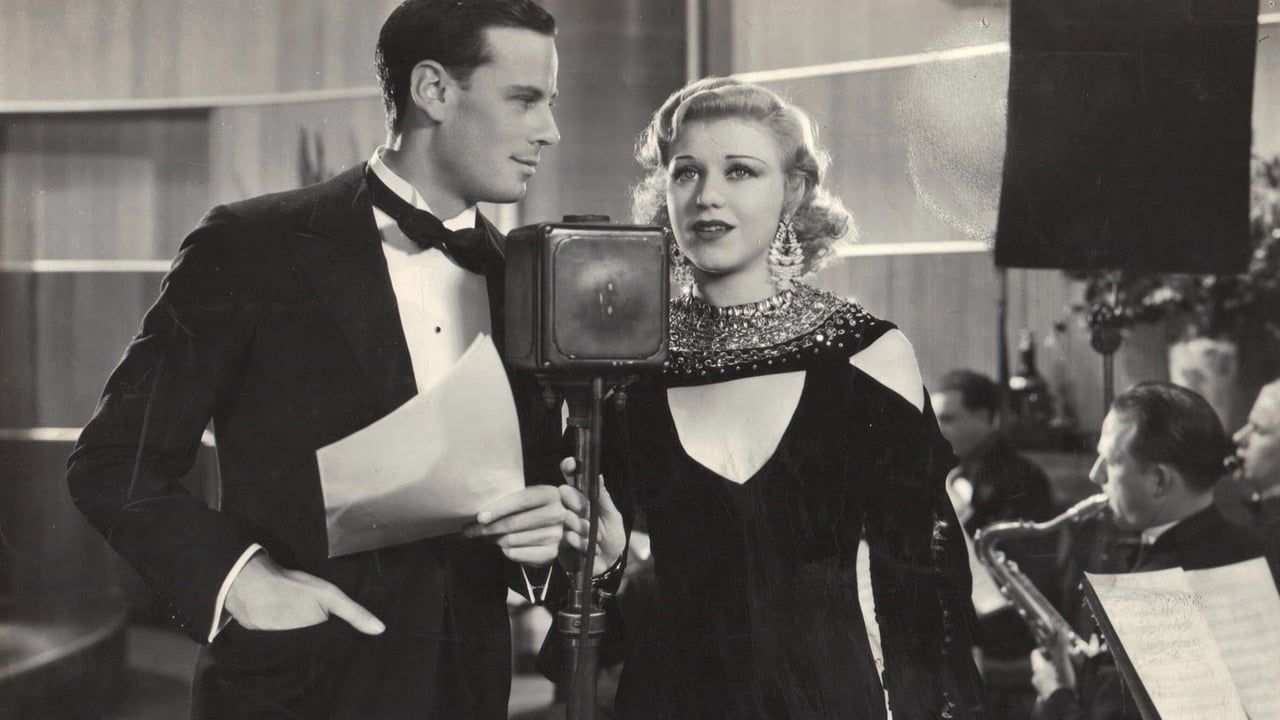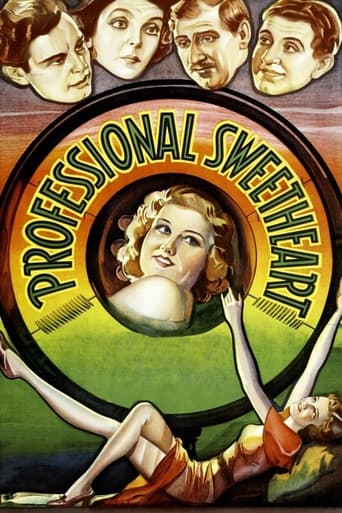Colibel
Terrible acting, screenplay and direction.
Beystiman
It's fun, it's light, [but] it has a hard time when its tries to get heavy.
Sameer Callahan
It really made me laugh, but for some moments I was tearing up because I could relate so much.
Janae Milner
Easily the biggest piece of Right wing non sense propaganda I ever saw.
marcslope
I'd been looking forward to this RKO programmer because it's by Maurine Watkins, a pretty smart writer who also was responsible for the play "Chicago," which became the movie "Roxie Hart," then the musical "Chicago." So she clearly knows about the value of publicity and the hypocritical nature of advertising and sponsorship. But those satirical targets are swiped at very broadly in this one, which keeps parading the name of the sponsor--Ippsie Wippsie--as if it were in itself hilarious. They're sponsoring a singing sweetheart, a dubbed Ginger Rogers, who personifies wholesome values and, predictably, is really the opposite of those values. I find Ginger's outbursts and shifts of mood unpersuasive and a little tedious, and she's surrounded by a supporting cast of Warners and RKO players who do what they always do--a simpering ZaSu Pitts, genial Frank McHugh, Brooklyn-streetwise Allen Jenkins, sputtering-in-a-foreign-accent Gregory Ratoff, swishy Franklin Pangborn, etc. Her leading man, Norman Foster, as a Kentucky farm boy who successfully woos her, is no great shakes, and Ms. Watkins also asks us to believe that a short time with him in the mountains would turn Ginger from a grasping spoiled brat who can't cook into a darling, kitchen-trained little wifey. The plot reversals are quick and unconvincing, and the bashing of the advertising industry is positively sledgehammer.
fabulutz
Ginger Rodgers shines in a role that might have been written for Jean Harlow. She cracks wise, hurls insults, and dances around in her underwear. Zazu Pitts is priceless as the gushing and gullible small town reporter. Franklin Pangborn is more blatantly gay here than we normally get to see him. This movie touches on many aspects of celebrity that remain true to this day. The manipulation of a public image and the team of professionals that that requires. The all important "product", the selling of which is the reason for everything. This movie is also amazingly tolerant and socially progressive for it's time. The attractive black housekeeper's character is more of a friend to Ginger, who's footloose lifestyle she envies. Pangborn's character as one of her handlers is made obviously gay without degradation or judgement. Don't expect "Dinner at Eight", but "Professional Sweetheart" is sparkling and breezy pre-code fun!
mgconlan-1
"Professional Sweetheart" was Ginger Rogers' first film for RKO studios after she left Warner Bros., and with Allen Jenkins and Frank McHugh in the supporting cast it almost seems like a Warners film in exile. It's a marvelous movie, smart and funny, with a script by "Chicago" author Maurine Watkins that, though it isn't a crime story, takes up another of Watkins' favorite themes: media manipulation and the gap between what we're told about celebrities and what they're really like. In "The Fred Astaire and Ginger Rogers Book," Arlene Croce wrote, "Almost any Ginger Rogers role is successful to the degree that it reflects the dualism in her personality (tough-vulnerable, ingenuous-calculating) or plays on her curious aptitude for mimickry or fantasy or imposture." Croce was writing about the major roles of her post-Astaire career — "Bachelor Mother," "Tom, Dick and Harry," "The Major and the Minor" — but it applies here just as well; by casting Rogers as a wise-cracking hard-bitten orphan girl forced to pose as the "Purity Girl," and having two radio sponsors and a husband (from an arranged marriage!) all with their own ideas of what they want from her, "Professional Sweetheart" gives Rogers an early showcase for the characteristics that would have made her an enormous star even if she'd never set foot on a dance floor with Fred Astaire. I can't understand why some of the other commentators on this film have criticized Watkins' script, since it seems to me to be well constructed and vividly satirical on celebrity and its discontents in a way that rings true even today.Another thing I liked about "Professional Sweetheart" is that it's one of the Gayest movies Hollywood ever made — so much so that I can't understand why TCM isn't showing it in their current "Screened Out" festival of Gay and Lesbian films when some other titles with much more peripheral Gay content did make their list. The supporting actors seem to be competing as to who can be the queeniest, with Franklin Pangborn (not surprisingly) winning: his looks of horror and disgust when any of the other characters suggests that he date a woman are priceless. Also pretty astonishing, even for the relatively liberal "pre-Code" era in Hollywood history, is Sterling Holloway's obviously cruising Allen Jenkins at the reporters' reception — imagine a Gay scene involving Jenkins in which he's the butch one!
MartinHafer
Despite this film having one of the more amazing groups of character actors for support, this is truly an awful film. It just goes to show you that no matter what talent you have assembled, it means nothing if the writing is bad--and boy, is it BAD! Even the combined supporting talents of Frank McHugh, Allen Jenkins, Akim Tamiroff, Franklin Pangborn, Edgar Kennedy, Sterling Holloway and others couldn't help Ginger Rogers elevate this mess to even mediocrity. The bottom line is the basic plot isn't at all believable and the dialog isn't any better. Normally when I watch older films, I am able to suspend disbelief and just enjoy, but this time it was a major chore not to just turn the movie off about midway through it! Ginger plays a radio star who is portrayed as so saccharine that it's impossible to believe that the public could stand her, though according to the film she's America's Sweetheart! Well, Ginger rebels against this as well, but her answer is to hang out in nightclubs and get drunk AND have sex (it's a "Pre-Code" film, so this sort of subject was NOT taboo in 1933). It's all very broadly acted and written and is supposed to be a sort of screwball comedy--the problem is that none of it is funny. What happens next and how everyone becomes happy in the end isn't really anything I want to discuss--I just want to never see this film again. It's a good thing Ms. Rogers had the Fred Astaire films to boost her career--if it was up to drivel like this, she never would have become famous!

